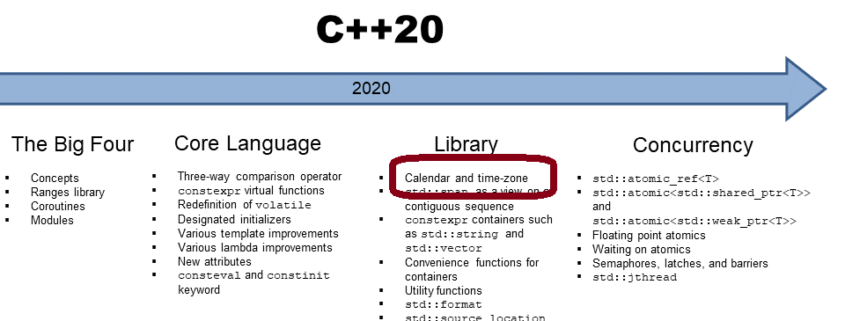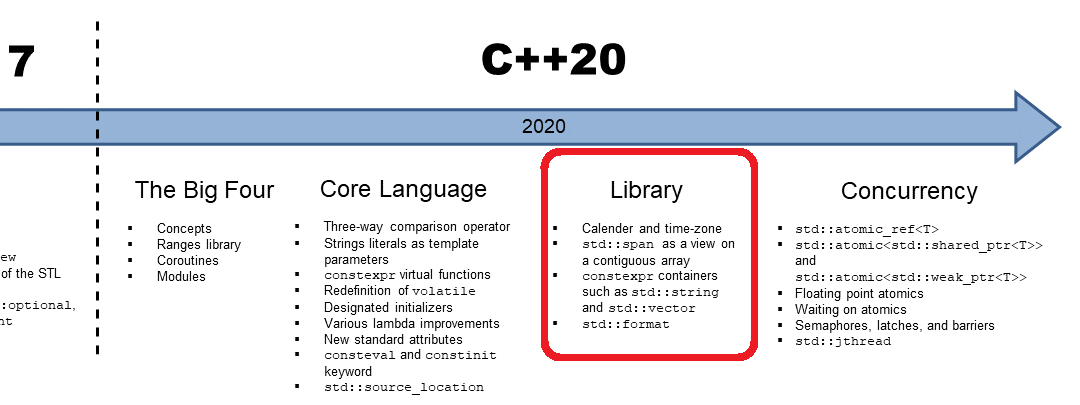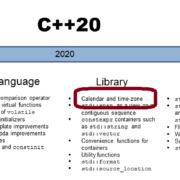Chrono I/O: Unformatted and Formatted
Chrono I/O consists of reading and writing chrono types. The various chrono types support unformatted writing and formatted one with the new formatting library.

This post is the tenth in my detailed journey through the chrono extension in C++20:
- Basic Chrono Terminology
- Basic Chrono Terminology with Time Duration and Time Point
- Time of Day: Details
- Creating Calendar Dates
- Displaying and Checking Calendar Dates
- Query Calendar Dates and Ordinal Dates
- Time Zones: Details
- Time Zones: Online Classes
- Chrono: I/O
Output
Most chrono types, such as time duration, time points, and calendar dates, support direct writing without format specification. Today, I continue with unformatted calendar dates.
Unformatted
The following tables show the default output format of calendar dates.
Calendar Dates
The following table shows the format specifiers, including a short description and an example. For the full description, refer to the cppreference.com/chrono/parse page.
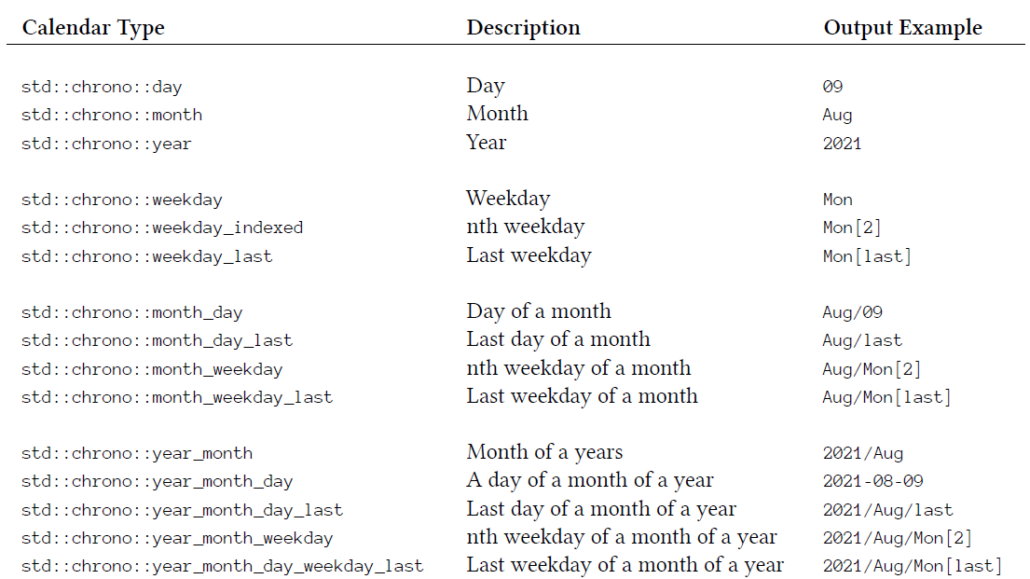
// createCalendar.cpp #include <chrono> #include <iostream> int main() { std::cout << '\n'; using namespace std::chrono_literals; using std::chrono::last; using std::chrono::year; using std::chrono::month; using std::chrono::day; using std::chrono::year_month; using std::chrono::year_month_day; using std::chrono::year_month_day_last; using std::chrono::year_month_weekday; using std::chrono::year_month_weekday_last; using std::chrono::month_weekday; using std::chrono::month_weekday_last; using std::chrono::month_day; using std::chrono::month_day_last; using std::chrono::weekday_last; using std::chrono::weekday; using std::chrono::January; using std::chrono::February; using std::chrono::June; using std::chrono::March; using std::chrono::October; using std::chrono::Monday; using std::chrono::Thursday; using std::chrono::Sunday; constexpr auto yearMonthDay{year(1940)/month(6)/day(26)}; std::cout << yearMonthDay << " "; std::cout << year_month_day(1940y, June, 26d) << '\n'; std::cout << '\n'; constexpr auto yearMonthDayLast{year(2010)/March/last}; std::cout << yearMonthDayLast << " "; std::cout << year_month_day_last(2010y, month_day_last(month(3))) << '\n'; constexpr auto yearMonthWeekday{year(2020)/March/Thursday[2]}; std::cout << yearMonthWeekday << " "; std::cout << year_month_weekday(2020y, month(March), Thursday[2]) << '\n'; constexpr auto yearMonthWeekdayLast{year(2010)/March/Monday[last]}; std::cout << yearMonthWeekdayLast << " "; std::cout << year_month_weekday_last(2010y, month(March), weekday_last(Monday)); std::cout << "\n\n"; constexpr auto day_{day(19)}; std::cout << day_ << " "; std::cout << day(19) << '\n'; constexpr auto month_{month(1)}; std::cout << month_ << " "; std::cout << month(1) << '\n'; constexpr auto year_{year(1988)}; std::cout << year_ << " "; std::cout << year(1988) << '\n'; constexpr auto weekday_{weekday(5)}; std::cout << weekday_ << " "; std::cout << weekday(5) << '\n'; constexpr auto yearMonth{year(1988)/1}; std::cout << yearMonth << " "; std::cout << year_month(year(1988), January) << '\n'; constexpr auto monthDay{10/day(22)}; std::cout << monthDay << " "; std::cout << month_day(October, day(22)) << '\n'; constexpr auto monthDayLast{June/last}; std::cout << monthDayLast << " "; std::cout << month_day_last(month(6)) << '\n'; constexpr auto monthWeekday{2/Monday[3]}; std::cout << monthWeekday << " "; std::cout << month_weekday(February, Monday[3]) << '\n'; constexpr auto monthWeekDayLast{June/Sunday[last]}; std::cout << monthWeekDayLast << " "; std::cout << month_weekday_last(June, weekday_last(Sunday)) << '\n'; std::cout << '\n'; }
Here is the output of the program.
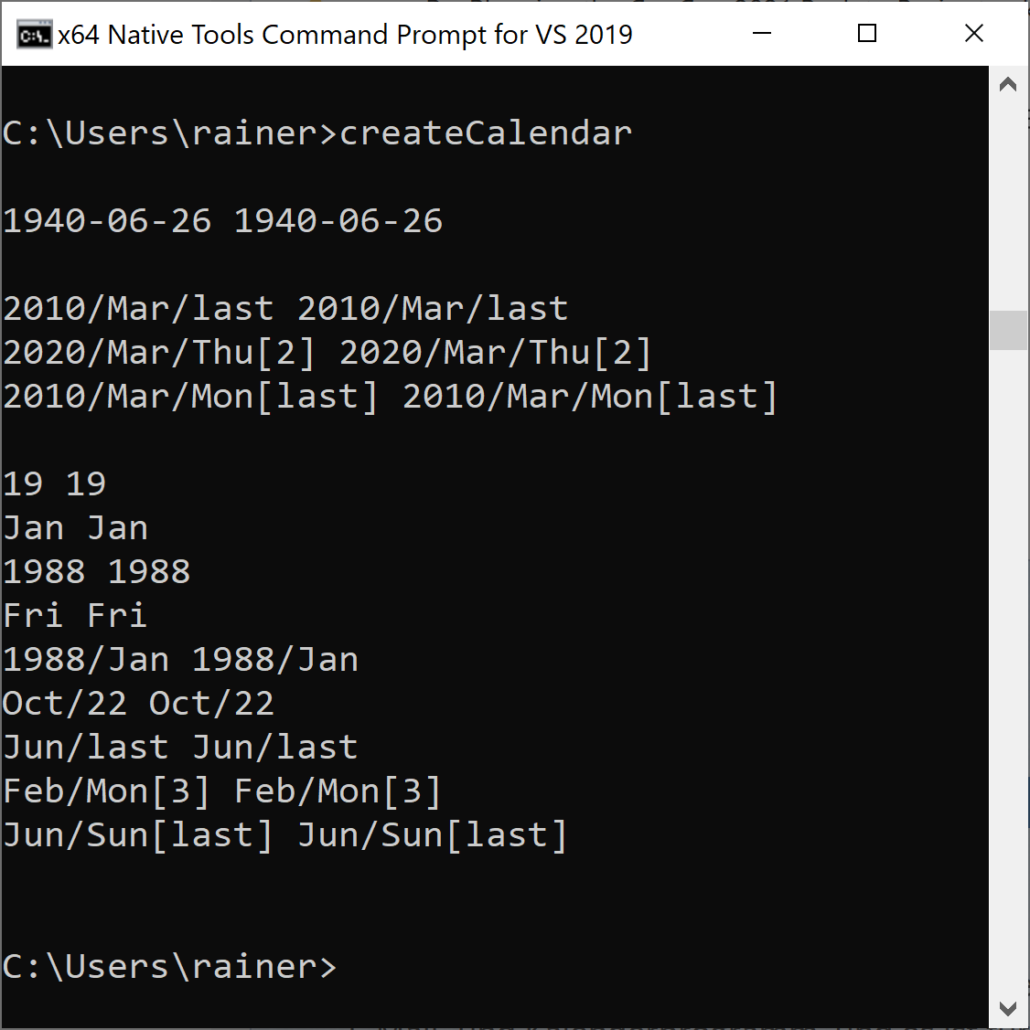
Formatted
The following tables show the format specifiers, including a short description and an example. Refer to the cppreference.com/chrono/parse page for the full description.
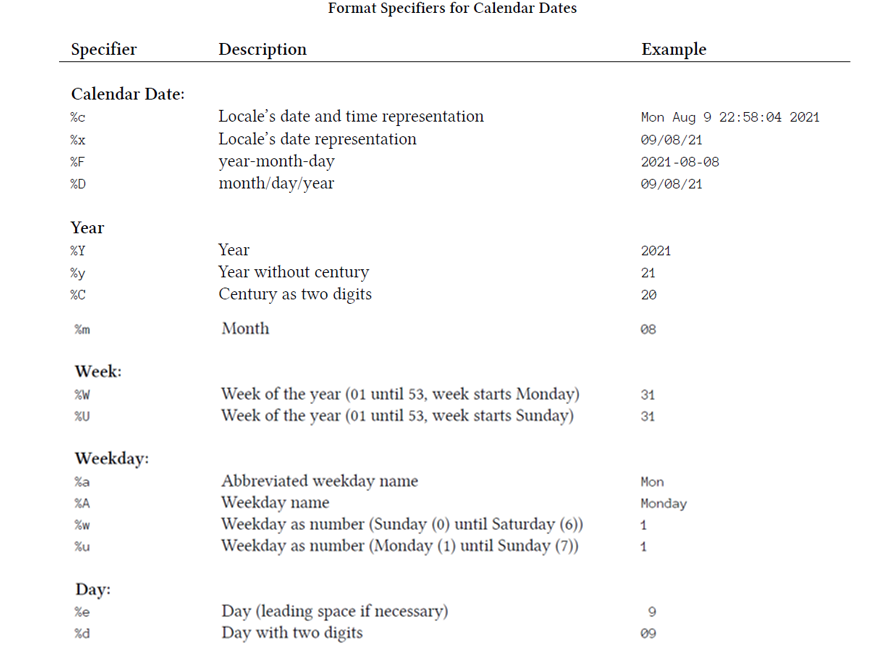
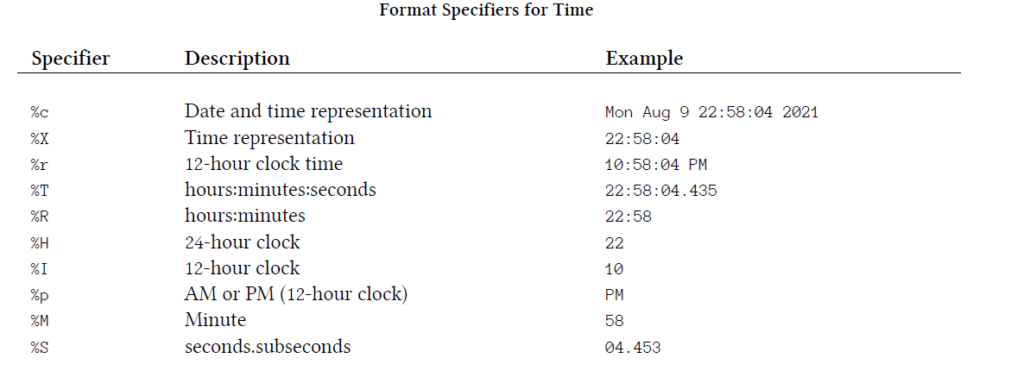

The following program uses the time specifier and calendar date specifiers.
// formattedOutputChrono.cpp #include <chrono> #include <iostream> #include <thread> int main() { std::cout << '\n'; using namespace std::literals; auto start = std::chrono::steady_clock::now(); // (1) std::this_thread::sleep_for(33ms); auto end = std::chrono::steady_clock::now(); // (2) std::cout << std::format("The job took {} seconds\n", end - start); std::cout << std::format("The job took {:%S} seconds\n", end - start); std::cout << '\n'; auto now = std::chrono::system_clock::now(); // (3) std::cout << "now: " << now << '\n'; std::cout << "Specifier {:%c}: " << std::format("{:%c}\n", now); std::cout << "Specifier {:%x}: " << std::format("{:%x}\n", now); std::cout << "Specifier {:%F}: " << std::format("{:%F}\n", now); std::cout << "Specifier {:%D}: " << std::format("{:%D}\n", now); std::cout << "Specifier {:%Y}: " << std::format("{:%Y}\n", now); std::cout << "Specifier {:%y}: " << std::format("{:%y}\n", now); std::cout << "Specifier {:%b}: " << std::format("{:%b}\n", now); std::cout << "Specifier {:%B}: " << std::format("{:%B}\n", now); std::cout << "Specifier {:%m}: " << std::format("{:%m}\n", now); std::cout << "Specifier {:%W}: " << std::format("{:%W}\n", now); std::cout << "Specifier {:%U}: " << std::format("{:%U}\n", now); std::cout << "Specifier {:%a}: " << std::format("{:%a}\n", now); std::cout << "Specifier {:%A}: " << std::format("{:%A}\n", now); std::cout << "Specifier {:%w}: " << std::format("{:%w}\n", now); std::cout << "Specifier {:%u}: " << std::format("{:%u}\n", now); std::cout << "Specifier {:%e}: " << std::format("{:%e}\n", now); std::cout << "Specifier {:%d}: " << std::format("{:%d}\n", now); std::cout << '\n'; }
The call std::chrono::steady_clock::now() (lines 1 and 2) determines the current time. You should use the std::chrono::steady_clock for measurements because this clock is monotonic and cannot be adjusted, such as std::chrono::system_clock (line 3).
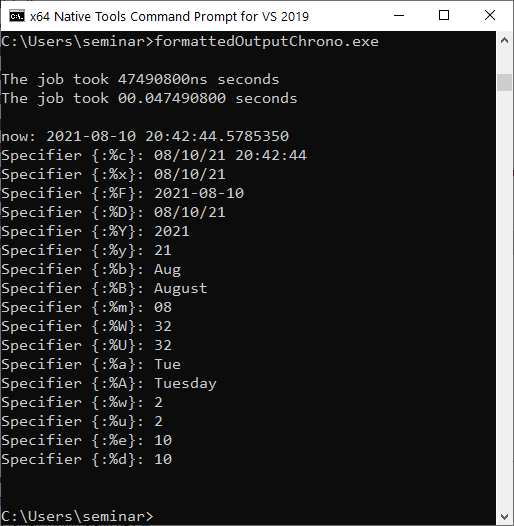
 Modernes C++ Mentoring
Modernes C++ Mentoring
Do you want to stay informed: Subscribe.
What’s Next?
You can also apply the format specifier for formatted input.
Thanks a lot to my Patreon Supporters: Matt Braun, Roman Postanciuc, Tobias Zindl, G Prvulovic, Reinhold Dröge, Abernitzke, Frank Grimm, Sakib, Broeserl, António Pina, Sergey Agafyin, Андрей Бурмистров, Jake, GS, Lawton Shoemake, Jozo Leko, John Breland, Venkat Nandam, Jose Francisco, Douglas Tinkham, Kuchlong Kuchlong, Robert Blanch, Truels Wissneth, Mario Luoni, Friedrich Huber, lennonli, Pramod Tikare Muralidhara, Peter Ware, Daniel Hufschläger, Alessandro Pezzato, Bob Perry, Satish Vangipuram, Andi Ireland, Richard Ohnemus, Michael Dunsky, Leo Goodstadt, John Wiederhirn, Yacob Cohen-Arazi, Florian Tischler, Robin Furness, Michael Young, Holger Detering, Bernd Mühlhaus, Stephen Kelley, Kyle Dean, Tusar Palauri, Juan Dent, George Liao, Daniel Ceperley, Jon T Hess, Stephen Totten, Wolfgang Fütterer, Matthias Grün, Ben Atakora, Ann Shatoff, Rob North, Bhavith C Achar, Marco Parri Empoli, Philipp Lenk, Charles-Jianye Chen, Keith Jeffery, Matt Godbolt, Honey Sukesan, bruce_lee_wayne, Silviu Ardelean, schnapper79, Seeker, and Sundareswaran Senthilvel.
Thanks, in particular, to Jon Hess, Lakshman, Christian Wittenhorst, Sherhy Pyton, Dendi Suhubdy, Sudhakar Belagurusamy, Richard Sargeant, Rusty Fleming, John Nebel, Mipko, Alicja Kaminska, Slavko Radman, and David Poole.
| My special thanks to Embarcadero |  |
| My special thanks to PVS-Studio |  |
| My special thanks to Tipi.build |  |
| My special thanks to Take Up Code |  |
| My special thanks to SHAVEDYAKS |  |
Modernes C++ GmbH
Modernes C++ Mentoring (English)
Rainer Grimm
Yalovastraße 20
72108 Rottenburg
Mail: schulung@ModernesCpp.de
Mentoring: www.ModernesCpp.org


